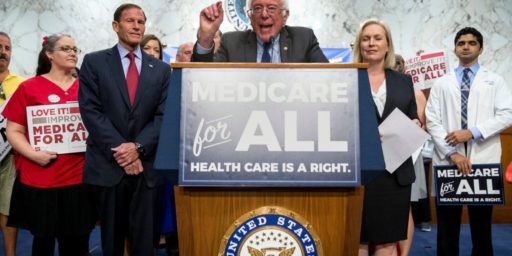Nathalie Blanchard Facebook Smile Leaves Her Depressed
Yet more evidence that privacy going away in the social media age.
Facebook can be a double-edged sword, a Canadian woman learned when an insurance company cut her health benefits, claiming she was healthy after seeing pictures of her smiling in bikini at the beach.
Nathalie Blanchard, 29, took long-term sick leave from her job at IBM in Bromont, Quebec, more than a year ago for severe depression. She was receiving monthly benefits from her insurance company, Manulife.
When Blanchard called Manulife to inquire why the payments dried up, the insurance company said that “I’m available to work, because of Facebook,” she told CBC television. She said that Manulife cited several pictures Blanchard had posted on her social networking website page, including some showing her enjoying herself during a male strip-tease show at a Chippendales bar, celebrating her birthday and bathing in the sun.
Based on these postings, the firm claimed Blanchard was no longer depressed.
Manulife declined to comment on the incident but said in a statement that “we would not deny or terminate a valid claim solely based on information published on websites such as Facebook.” But the company did recognize that it uses such information to learn more about their clients.
Hilarious. I’m not sure that a few instances of smiling over the course of a year proves that Blanchard isn’t clinically depressed. But it’s hard to argue that her insurance company ought to subsidize a lifestyle of strip shows and beach vacations.






I’d suspect that a clinically depressed person could have a good day at the beach, before or after a long dark night of the soul.
This is why I believe in the honest use of pseudonyms, or at least identities shortened to a first name.
In this modern world it might be a little easier to be honest when you don’t have to tune your message to fit everyone from your kid, to your boss, to your insurance company.
Well, obviously, if you’re claim is that you are so depressed you can’t work, photos of you actively happily participating in social activities would be cause for the insurance company to become suspicious. Maybe she should have posted some photos of her in her depressed state.
One can simultaneously suffer from clinical depression and not be “depressed” at any given moment.
If the terms of the policy are at such a level, the insurance company most certainly ought. By example, I currently have a Long Term Disability policy that covers 60% of my salary (which, since such benefits aren’t taxed is effectively my whole salary). I would be capable of a comfortable life on that ammoun.
It seems bizarre to argue the company is not expected to meet the obligation I spent years paying for because you have some weird belief that disabled people need to be appropriately miserable.
Health insurance companies are criminal conspiracies.
Example from my recent battles to get a new policy: after submitting all the paperwork and being told everything was done and ship-shape we were alerted by our broker to the fact that the company would send us a letter which I was required to sign. The only reason I knew this letter was coming was the broker’s warning. It didn’t show up as a registered letter, it showed up looking like junk mail.
The broker explained that this is a standard trick for this company: even though they accept you and start billing you and may even start paying claims, if you somehow missed this very missable letter, they can later cancel your policy.
They will take your money knowing that they have a secret ace in the hole to deny you the benefits you paid for.
These are the people we’re dealing with. These are criminals perpetrating fraud on their customers.
Actually, it is quite easy to argue that. If an insured qualifies as disabled as defined in a contract, the payments made under that contract are not made subject to the payor’s definition of acceptable use of that money.
Sounds like stories tha floated around about a mutual in Omaha in the ’80’s. Why you would consider doing business with such a company is a mystery. If they’re willing to do that, they’re quite likely to find another excuse not to pay claims. All the same, if your broker is aware of the practice, the state insurance commissioner can’t be totally in the dark about it.
Randy:
Because there are no other options. I have to buy my own insurance. And I had to form a corporation in order to qualify.
This is a temporary policy, the only one we could find until we could jump through all the hoops and traps laid out to keep us from getting our corporate policy in place.
People who have employer-provided plans have no idea what it’s like. That’s one of the reasons we have otherwise intelligent people imagining there’s nothing wrong. They’re like children who don’t worry about the mortgage because Mom and Dad take care of it.
But the employer-provided paradigm is in decline and more and more people will be where I am, and where small businessmen are. And then they are going to wonder why the hell the GOP and the Blue Dogs fought so vociferously to stop a public option.
Eventually we’ll get a public plan but the conservatives will have allowed insurance companies to keep their private jets a while longer. The bankruptcies and deaths that result will be as nothing next to Mitch McConnell’s campaign chest and Blanche Lincoln’s re-election prospects. After all: priorities.
I’m aware of that but depression like back injuries is used to defraud insurance companies so they look for instances inconsistent with the claim. Thus my comment she should have chronicled her depressed states or not chronicle states that undermine her claim for payments.
Should the insurance company stopped her payments out of hand without first requiring an explanation probably not. Sending a notice of ending payments giving the claimant 30 days to explain would be better business. However, from a loss control point of view, stopping the payments on legitimate suspicion and requiring the claimant to re-establish the claim is the most efficient. It stops the expenditure of funds, discourages fraudulent claimants from pursuing the matter and causes legitimate claimants to answer the suspicions rather then ignore the matter. Which is more likely: recovering payments to a fraudulent claimant or receiving withheld payments by a legitimate claimant who answers the suspicions satisfactorily.
JKB:
I assume you work in the insurance industry. Because its hard to imagine anyone else rationalizing the process whereby “insurers” go hunting for people to cut off, cut them off pre-emptively without warning, then force the insured — often a sick or dying person, or the parent of a sick or dying child — to jump through hoops in order to re-establish benefits.
And of course the insurer can do this over and over again. I mean, why not? Why not periodically cancel everyone’s coverage and force each of them to prove their case? After all, that would certainly result in higher profits on the backs of people who may be too sick to respond, or may be too busy holding down three jobs to handle the non-covered costs to spend hours and hours dealing with insurers.
Better by far to screw sick people than risk corporate bonuses.
You’ve done a fine job of demonstrating why we need a public option.
Michael, I’d agree if there weren’t lots of people out there willing to game the system to collect on bogus claims. What is the solution to address the fraud?
Is the public option solution to that to just allow the fraud?
Of course, we’re not talking about arbitrarily stopping payments to the sick and dying but rather stopping payments to those based on legitimate suspicions that their condition is no longer as was claimed.
This is basic fraud detection/prevention. If Obama were to really go after waste, fraud, and abuse in Medicare/Medicaid, you will see a lot of this very action. The public option will either have to have aggressive fraud detection/prevention or it will spiral out of control far faster than feared. Of course, with the public option, they’ll not only cut off the benefits but send a federal agent to investigate you. Just like they do now with Medicare/Medicaid fraud.
The only question here is whether the insurance company took this action solely on a couple of posted photos or did the posted photos spur a closer look at this claim. There is no evidence the insurance company acted arbitrarily without legitimate suspicion.
And no, I do not work in the insurance injury. My exposure was as a federal manager who worked to facilitate legitimate worker comp claims of my employees and to document cases against those suspected of making up claims. You must have a very small business without any employees or physical labor if you’re not familiar with managing workers comp claims.
John and JKB:
I think the disconnect here is that I don’t think this is basic fraud prevention. I think it’s an attempt to maximize profit by denying legitimate coverage. In other words, I think it’s the insurers who are committing fraud, and on a massive scale. (See my 1:48 comment above.)
The motivations for insurers are quite clear: any time they can collect a premium and deny a benefit they profit.
“Standard” and “legitimate” are irrelevant standards when your only motivation is maximization of profit. Why would the insurance companies not behave this way? It makes perfect sense for them. There is literally no downside.
Michael, I think it’s a matter of degree and I do believe that in many cases the motivation is to deny benefits for profit. However that doesn’t make scrutinizing claims for fraud is something that any insurance carrier has to do. There just has to be a balance.
I wan’t insurance companies to be vigilant to catch fraud as the bottom line is the more fraud there is the higher the premiums are going to be for everyone else. By the same token I don’t want them getting away with denying legitimate claims. The details in the article make me think it’s at least a possibility that Blanchard was collecting payouts that she shouldn’t have been entitled to.
James- We need more strip shows, not fewer. Get in there and back up this poor soul.
Steve
Which will be provided when a public option exists and can look at the situation from a different perspective. The PO would provide an alternative to rapacious and dishonest insurance company practices.
And who exactly stops them? The states do a pathetic job of regulating insurance. Another compelling argument for a public option.
I have no issues with an insurance company investigating claims to make sure they aren’t being defrauded, but depression isn’t something that is diagnosed from pictures and shouldn’t be undiagnosed from pictures. If you have a claim for a back injury and the guy posts pictures of himself skiing and weight lifting on his Facebook-there is a pretty good chance you could prove fraud from the photos, but I don’t think you can prove fraud with regard to depression through photos.
Now the article does say they used other criteria, it would be interesting to see what that criteria is.
So some anonymous hack at the insurance company saw a picture of her smiling? This is as stupid as Tom DeLay diagnosing Terri Schiavo from the floor of the Senate.
Not that I have a ton of faith in psychiatrists, but shouldn’t someone with some sort of education covering mental illnesses be in charge of diagnosing her? Valid fraud prevention would involve paying for her to go visit someone so trained.
RWRogers has already shown that, in fact, it’s not very hard. But to take it further – who says the insurer is subsidizing this “lifestyle?” (As though a couple of pictures taken over the course of a year describe a lifestyle). I’d bet her girlfriends took her to the Chippendales show to try and cheer her up.
And a trip to the beach? Did her husband or boyfriend take her? Did her parents retire to Florida, and invite her down? Did she have savings and pay her own way, as part of self-treatment?
How does where she chooses to try and recover affect the insurer’s responsiblity to pay contracted benefits?
Yeah, when she was so depressed that she couldn’t get out of bed for three days except to use the toilet, not even to eat, and so ashamed of herself for “allowing herself” to fall to this state, she should have set the camera up on a tripod and taken some pictures and logged onto Facebook to document it all. And when she was feeling a little better, she never should have posted any pictures to anchor that feeling or to let friends and loved ones know of her improvement.
After posting my last I got sent back to the homepage, and saw JJ’s title for this post again. The rebroadcast of the individual’s full name, the equation of disappointment at a (implied) scam gone awry with “depression”….I’m not feeling a lot of sympathy for real victims of depression, here.
The title, combined with the attitude revealed in the final graf – it reminds me of something I read once, that one of the core differences between liberals and conservatives is on the question of whether the afflicted should suffer.
JJ apparently thinks this woman should visibly suffer before an insurance company pays benefits it was contracted to pay, upon her diagnosis by a physician.
On health care, the cons say no single payer – when enough people suffer from lack of health care, market forces will magically amend the situation.
Libs think poverty is a problem to be solved, cons think it a motivating force….etc, etc.
Sounds like both parties are a little smelly. She got caught exploiting a condition she, no doubt, was well enough to work on some level…part time..flex schedule….something. And of course the insurance company, having taken money for YEARS from people who NEVER filed a claim, I’m sure, couldn’t stand being out money to someone who actually qualified to receive benefits. That makes both of these parties greedy and unworthy of too much sympathy from any one.
The law doesn’t work on karma, where if the company is defrauded by customer A it becomes okay for them to defraud customer B in pursuit of some sort of balance.
FYI, it was Bill Frist.
In any event, I just wanted to say that it’s hard for me to have any sympathy for people who don’t choose to limit access to their Facebooks to friends only.
“But the employer-provided paradigm is in decline and more and more people will be where I am, and where small businessmen are. And then they are going to wonder why the hell the GOP and the Blue Dogs fought so vociferously to stop a public option.”
Of course this is a complete lie, as the GOP has made reducing the incentives for employer-provided insurance, coupled with reform of existing regulation to allow insurers to offer plans across state lines, part of their reform proposals. But then Mr. Reynolds has never let the truth get in the way of a good diatribe.
His is a particulalry disingenuous straw man: Either we scrap the whole system or keep it exactly as it it. Those aren’t our choices and intellectually honest people can admit it.
Good point and good point.
Thanks for sharing.
Not only that, she showed her face in public! What was she thinking? An insurance agent could have seen her smile at the cashier at the Walmart where she puchased a tub of ice cream and a box of tissues, thus proving her non-depression.
Seriously, if you’re use of Facebook is such that you are worried that other people will see, maybe Facebook isn’t the problem. My profile is public, I treat it like a public space. If someone were to read my Facebook profile, all they would learn is that I’m a technophile with a family.
I agree with you 100%. But, if someone chooses to have a public Facebook, and something they choose to post in a public forum comes back to haunt them, I am not particularly sympathetic.
I wasn’t trying to blame Facebook.
I missed the part where I said anything like that.
A public option isn’t scrapping the whole system. Which you would admit if you were “intellectually honest.”
“A public option isn’t scrapping the whole system. Which you would admit if you were ‘intellectually honest.'”
Saying switcing from a market-based system to a government-based system isn’t “scrapping the whole system” is either breathtakingly dishonest or breathtakingly naive. I’ll let you choose.
Now if only we actually had a market-based system…